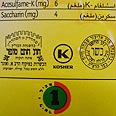
Kosher (Illustration)
צילום: גבי מנשה
Bodies to probe kosher meat plant
Religious bodies launch probe following Forward's investigation over substandard working conditions at AgriProcessors, US largest kosher slaughterhouse
Two key national bodies of Conservative Judaism have created a task force to investigate and respond to complaints of substandard working conditions at US largest kosher slaughterhouse, first described in a Forward investigation.
Separately, initial steps have been taken by national bodies of Orthodox Judaism to examine the validity of the allegations and explore possible responses. Sources among Orthodox leadership said the steps came in response to expressions of alarm from "members and constituents."
The Conservative movement's task force, spearheaded by Rabbi Morris Allen, will begin its work with a fact-finding mission to Postville, Iowa, the home of the kosher slaughterhouse AgriProcessors. The task force is a joint project of the movement's two national bodies, the Rabbinical Assembly and the United Synagogue of Conservative Judaism. Allen co-chairs the United Synagogue's social action committee.
"We are major consumers of this meat," said Allen, who has made past visits to the Iowa slaughterhouse from his base in nearby Minnesota. "To remain silent in the face of what may be inappropriate business practices is totally inappropriate on our part."
Initial steps within the Orthodox community have been less decisive. The largest organization of Orthodox rabbis, the Rabbinical Council of America, sent a representative earlier this month to investigate working conditions at the plant, but no findings had been released at press time.
Several sources inside the Orthodox Union, the main Orthodox congregational association and the nation's largest kosher certifying organization, said there has been disagreement about how to assess the conditions and what the movement's response should be.
Substandard working conditions
The Forward's article about conditions at Agriprocessors appeared in late May, and came out of interviews with dozens of Hispanic immigrant workers at the plant. It is estimated that some 90 percent of the plant's workers are Hispanic immigrants, many of them undocumented.
A spokesman for the plant, Mike Thomas, has since written to the Forward stating that "every Agriprocessors employee must provide documentation" and "all Agriprocessors employees are reported to the government."
The plant accounts for more than half of all violations handed out to Iowa slaughterhouses by the Occupational Safety Health Administration this year.
Industry experts told the Forward that wages paid to workers at AgriProcessors are among the lowest in the slaughterhouse industry, despite the premium price at which AgriProcessors sells its kosher meat. Several workers at the plant also told the Forward they received virtually no safety training, which they said contributed to accidental amputations and other health problems.
'Workers were happy'
The company responded with a full-page advertisement in the Forward denying that the working conditions at the plant were remiss. In addition, an article appeared in the Jewish Press, a Brooklyn weekly with wide circulation in the Orthodox community, repudiating the Forward's reporting.
The article, written by constitutional lawyer Nathan Lewin, who has represented AgriProcessors, made reference to an alternate report on conditions at the plant that had been written by Minnesota Rabbi Asher Zeilingold. Zeilingold, who is paid by AgriProcessors to provide kosher certification for its meat, visited the plant after the Forward's report was published and said the workers he met were happy.
"If conditions are as terrible as describes," Lewin wrote, "how could Rabbi Zeilingold have found, in his words, 'that here was a food plant in small-town America that had workers who were satisfied and felt their lives had meaning and fulfillment?'"
To date, most religious authorities have avoided making public statements about the specific nature of conditions at the plant. The administrator at one widely accepted kosher certification organization, K'hal Adath Jeshurun, said his organization is not interested in labor questions.
The director of kosher supervision at the O.U., Rabbi Menachem Genack, said that whether AgriProcessors is on the high or low end of the industry in areas like wages and working conditions, he was confident that the firm is not violating any laws.
Reprinted with permission of Forward weekly










